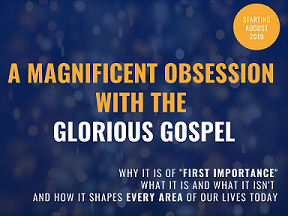Our Western/Greek mindset wants to define things and categorise them. Lean too far in this direction and things can become too cold and clinical. Many Asian mindsets are more intuitive and organic. Lean too far this way and things become too loose and fuzzy. It seems it’s best to both describe & sketch/storyboard rather, especially when it comes to God and the Gospel!
On Sunday we started with ‘the narrowest expression of the gospel,’ moving onto ‘the widest/fullest expression of the gospel.’ Then we asked, ‘why do we need Paul’s gospel?’ Combining these three ideas, I came up with a description (rather than a ‘definition’) of the gospel.
Reflection and Discussion
1) Look again at 1 Corinthians 15:1-11 (“the narrowest expression”). What observations can we make about the ‘gospel for believers’ in the first 3 verses? What 4 ‘minimum ingredients’ do we see in verses 3 to 10?
2) Look at Ephesians 3:1-13; Galatians 3:7-9; 25-29 and Romans 1:13-17 (“the widest expression” plus Paul’s gospel). Jesus answered his disciples regarding their question, “…what will be the sign of your coming and of the close of the age?” by talking of wars, rumours of wars, famines and earthquakes, false messiahs and prophets, increased persecution of believers before saying, “And this gospel of the kingdom will be proclaimed as a testimony to all nations and then the end will come” (Mat. 24:3-14). The “kingdom” is an all-encompassing word to describe God’s rule and reign, both in submitted hearts and His rightful rulership of the entire created order. Paul says he was made a minister “of this gospel…to preach “to the Gentiles the unsearchable riches of Christ” (Eph. 3:7-8). “Unsearchable” speaks of something that cannot be fully traced out, it’s impossible for us to fully comprehend the glory of God. Yet we can know God in an intimate way because of the gospel. Can you see from these passages that “the plan of the mystery hidden for ages in God” (Eph. 3:9) is that all (including the Jew) fall short of the glory of God and hence all need the new birth in order to be part of the “one new man” (2:15), “…so that through the church the manifold wisdom of God might be made known to the rulers and authorities in the heavenly places. This was according to the eternal purpose that he realised in Christ Jesus our Lord…” (vss. 10-11)? Does this leave place for any racism, sexism, prejudice, elitism, etc. in the church? Isn’t it revealing that these ‘isms’ are still alive and well across the world, causing untold misery?
3) Why don’t you write out your own understanding of ‘the gospel’ based on these passages? Here is my stab at describing the gospel:
‘The Gospel’ means the good news that what God promised since the Creation &the Fall, confirming these promises through many covenants over thousands of years, Jesus has fulfilled. Jesus has rescued us from the penalty of sin by dying in our place, paying in full our debt of sin through his blood shed on the cross, giving us a complete and unconditional pardon. Moreover, not only are we justified in his sight forever, but also citizens of His Kingdom, receiving his righteousness, his perfect record of goodness/ purity/ holiness, being reconciled to our Father in heaven so that we might enjoy the love shared by the Father and Son, this love shared abroad in our hearts by the Holy Spirit who now indwells us, proving our adoption/ full rights as his children and guaranteeing our future inheritance along with the Bride of Christ made up from all nations. Saved by grace alone, we live empowered by grace and are part of his body, the church, until Jesus returns to complete our salvation, our resurrected bodies dwelling on the new earth and heaven with Him forevermore.

